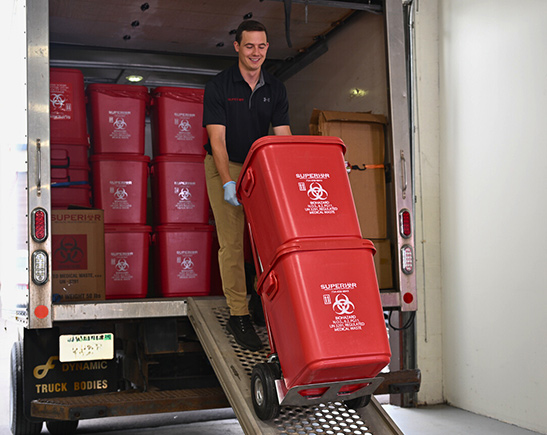The Importance of Proper Waste Disposal Practices
From the repercussions of incorrect waste disposal on our setting to the lasting implications for future generations, the value of adopting lasting waste management techniques can not be overemphasized. By discovering the environmental influence of reckless waste disposal, the benefits of reusing initiatives, and the relevance of neighborhood engagement in waste reduction initiatives, a deeper understanding of why correct waste disposal methods are essential arises.
Ecological Impact of Improper Disposal
Incorrect disposal of waste poses a considerable hazard to the environment as a result of its destructive impacts on communities and human wellness. When waste is not properly managed, it can result in contamination of the water, soil, and air, triggering harm to various plant and animal varieties. click here. Chemicals and contaminants from improperly disposed waste can seep into the ground, contaminating groundwater resources and impacting the health of both wild animals and human beings
Moreover, the buildup of waste in land fills generates greenhouse gases like methane, adding to environment adjustment and worldwide warming. Incorrect disposal methods likewise lead to littering, which not only deteriorates the aesthetic value of the setting yet can likewise damage wild animals with ingestion or entanglement.
To mitigate these environmental effects, it is critical for neighborhoods and individuals to adopt correct garbage disposal practices such as recycling, composting, and liable contaminated materials disposal. By taking these actions, we can assist protect communities, preserve all-natural sources, and protect human health for future and existing generations.
Benefits of Recycling Programs
Frequently getting involved in reusing programs offers countless advantages for both the environment and culture all at once. One of the key benefits of recycling is the conservation of natural deposits. By recycling materials such as paper, steel, plastic, and glass, much less raw materials require to be removed from the planet, resulting in lowered deforestation, mining, and exploration activities. This conservation of resources not only helps in preserving ecological equilibrium yet likewise adds to sustainable advancement.
Moreover, recycling plays a critical role in minimizing power consumption and greenhouse gas discharges. The manufacturing of items from recycled materials typically needs much less power compared to producing from virgin sources - medical waste disposal. Therefore, the carbon impact linked with the manufacturing process is dramatically decreased, aiding in the battle versus climate modification
Additionally, reusing programs develop work opportunities in the recycling market, advertising financial development and social welfare. By encouraging the recycling and reuse of materials, these programs support a round economy that reduces waste generation and takes full advantage of resource effectiveness, eventually bring about a cleaner, greener future for generations ahead.
Contaminated Materials Monitoring Guidelines
Implementing effective harmful waste monitoring standards is critical for minimizing environmental and health risks connected with the incorrect disposal of hazardous materials - click here. Appropriate handling, treatment, and disposal of contaminated materials are vital to avoid contamination of soil, water sources, and air
One key guideline appertains labeling of contaminated materials containers to guarantee risk-free handling and transportation. Additionally, facilities must follow rigorous storage space demands to avoid leakages, spills, or mishaps that might endanger human health and the setting. Routine training programs for workers on contaminated materials administration methods are also vital to guarantee compliance with regulations and advertise a culture of safety.
Additionally, contaminated materials needs to be set apart based on its residential properties to stop chemical responses that could bring about hazardous situations. Applying a detailed waste tracking system can aid keep an eye on the movement of unsafe products from generation to disposal, making sure transparency and liability. By complying with these standards faithfully, services and industries can add to a safer and cleaner setting for present and future generations.
Neighborhood Participation in Waste Reduction
To successfully address the ecological and health dangers connected with harmful waste management, engaging the area in waste reduction efforts is paramount. Neighborhood involvement plays an essential function in advertising sustainable waste administration techniques and fostering a culture of ecological responsibility. By informing homeowners about appropriate waste partition, reusing, and composting techniques, communities can dramatically reduce the amount of waste sent to garbage dumps, therefore reducing ecological pollution and conserving all-natural sources.
Area participation in waste reduction programs likewise assists in elevating recognition about the significance of waste minimization and motivates people to embrace eco-friendly practices in their every day lives - medical waste removal service. Collaborative initiatives between local authorities, waste administration firms, and area members can result in the implementation of effective waste reduction strategies customized to the details needs of each neighborhood or town
Moreover, community involvement cultivates a feeling of ownership and responsibility among locals, empowering them to take proactive actions in the direction of minimizing waste generation and promoting a cleaner, healthier setting for future and existing generations. By collaborating in the direction of typical waste reduction objectives, areas can make a considerable effect on mitigating the damaging impacts of improper garbage disposal methods.

Future of Sustainable Waste Practices
The advancement of sustainable waste methods is critical for advancing environmental stewardship and source conservation in the coming years. As the worldwide populace official statement continues to grow, so does the quantity of waste created (medical waste removal). Standard garbage disposal techniques, such as landfilling and incineration, are no much longer sustainable in the long-term because of their substantial ecological impacts. Moving on, the future of sustainable waste techniques depends on welcoming a circular economic climate technique, where sources are recycled, reused, or repurposed to lessen waste generation.
Technical technologies play a vital duty in forming the future of lasting waste methods. Advanced waste sorting and recycling technologies can assist enhance the performance of waste monitoring processes, enabling for the healing of valuable resources from waste streams. Additionally, the adoption of biodegradable materials and composting approaches can help in reducing the amount of organic waste winding up in land fills, therefore minimizing greenhouse gas discharges.
Moreover, promoting customer understanding and education on appropriate waste segregation and disposal techniques is essential for driving behavior modification towards sustainability. By fostering a society of waste reuse, recycling, and decrease, neighborhoods can collectively add to a cleaner and healthier atmosphere for future generations.

Final Thought
In verdict, appropriate garbage disposal techniques are important for minimizing environmental effect and advertising sustainability. By executing reusing programs, taking care of contaminated materials correctly, and encouraging neighborhood involvement in waste decrease initiatives, we can function towards a cleaner and healthier atmosphere. It is very important for businesses, governments, and individuals to prioritize sustainable waste practices for the future wellness of our planet.
.jpg)
From the effects of inappropriate waste disposal on our setting to the long-lasting ramifications for future generations, the relevance of embracing sustainable waste management techniques can not be overemphasized. By checking out the environmental effect of careless waste disposal, the benefits of reusing efforts, and the significance of community involvement in waste decrease efforts, a deeper understanding of why correct waste disposal methods are important emerges.
By enlightening citizens regarding correct waste partition, recycling, and composting strategies, neighborhoods can considerably reduce the quantity of waste sent out to landfills, consequently lessening environmental air pollution and saving all-natural sources. (click here)
Relocating onward, the future of lasting waste techniques exists in welcoming a round economy approach, where resources are recycled, reused, or repurposed to lessen waste generation.
Advanced waste sorting and reusing innovations can assist enhance the efficiency of waste management processes, permitting for the recuperation of beneficial sources from waste streams.
Comments on “Specialist Solutions for Health And Wellness: Revealing the Medical Waste Removal Service Benefit”